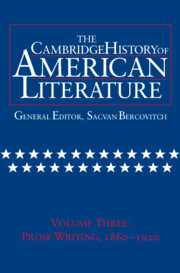Book contents
- Frontmatter
- Introduction
- THE AMERICAN LITERARY FIELD, 1860–1890
- LITERARY FORMS AND MASS CULTURE, 1870–1920
- PROMISES OF AMERICAN LIFE, 1880–1920
- BECOMING MULTICULTURAL: CULTURE, ECONOMY, AND THE NOVEL, 1860–1920
- 1 Introduction
- 2 Remembering civil war
- 3 Social death and the reconstruction of slavery
- 4 Cosmopolitan variations
- 5 Native-American sacrifice in an age of progress
- 6 Marketing culture
- 7 Varieties of work
- 8 Corporate America
- 9 Realist utopias
- Chronology 1860–1920
- Bibliography
- Index
6 - Marketing culture
from BECOMING MULTICULTURAL: CULTURE, ECONOMY, AND THE NOVEL, 1860–1920
Published online by Cambridge University Press: 28 March 2008
- Frontmatter
- Introduction
- THE AMERICAN LITERARY FIELD, 1860–1890
- LITERARY FORMS AND MASS CULTURE, 1870–1920
- PROMISES OF AMERICAN LIFE, 1880–1920
- BECOMING MULTICULTURAL: CULTURE, ECONOMY, AND THE NOVEL, 1860–1920
- 1 Introduction
- 2 Remembering civil war
- 3 Social death and the reconstruction of slavery
- 4 Cosmopolitan variations
- 5 Native-American sacrifice in an age of progress
- 6 Marketing culture
- 7 Varieties of work
- 8 Corporate America
- 9 Realist utopias
- Chronology 1860–1920
- Bibliography
- Index
Summary
During the television coverage of the 1984 Winter Olympics, novelist John Updike found himself riveted, not by the Games but by the high-stakes advertising that accompanied them. “I have no doubt that the aesthetic marvels of our age, for intensity and lavishness of effort and subtlety of both overt and subliminal effect, are television commercials,” he commented, adding, “except within narrow professional circles, the artists involved, like Anglo-Saxon poets and Paleocene cave-painters, are unknown by name.” Updike's observation was anticipated almost a century earlier by editors at Munsey's magazine, who noted in a July 1895 column that
some of the cleverest writing – the most painstaking, subtle work turned out by literary men today – can be found in the advertising pages of a first rate magazine. Every word is measured, examined under a magnifying glass, to see just how big it is, just how much meaning it has, and how many kinds of meaning it has.
The rise in the aesthetic stakes of advertising coincided with the rise in its commercial stakes: in the post-Civil War era advertising expenditures grew exponentially, from $50 million just after the war to $500 million by the century's end. Magazine editors recognized how fully implicated were their cultural activities in the business end of their enterprises. The inclusion of specific advertisements in their periodicals, for instance, served as implicit endorsements of the commodities they featured, even raising concerns about liability, as confirmed when Cyrus Curtis and Edward Bok announced that their magazines would no longer advertise patent medicines. The commercial reciprocity between editors and advertisers was clear: magazines sought to sell their space to the highest bidders, just as advertisers sought the most illustrious and widely disseminated forums. “Magazines like McClure's,” an eight-year-old-boy declared to his mother in a 1904 ad, “tell you what you want, and show you where you can get it.
- Type
- Chapter
- Information
- The Cambridge History of American Literature , pp. 568 - 615Publisher: Cambridge University PressPrint publication year: 2005



